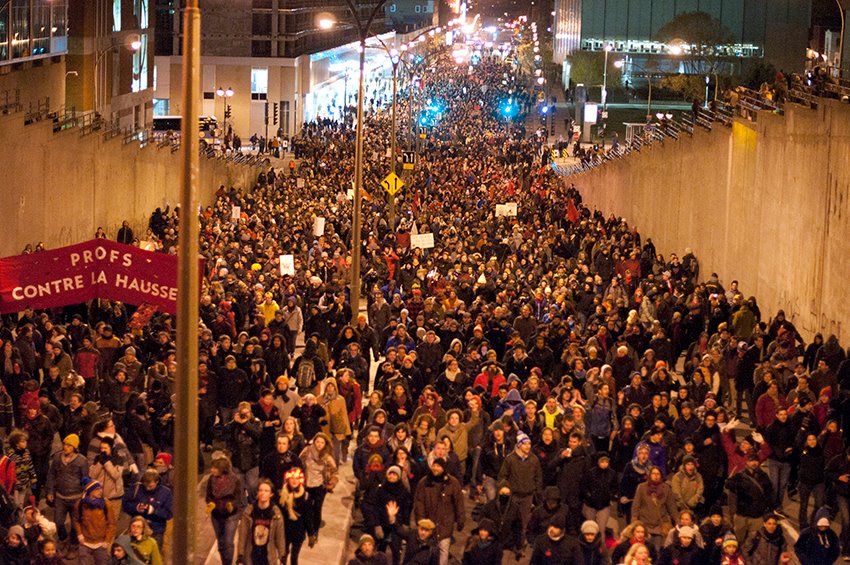Vibrant nightly protests over the past week in downtown Montréal, in solidarity with the Quebec student strike, are sparking global attention. As the Quebec-wide strike continues – it has now been going for over 11 weeks – a new energy is apparent in the city.
All across the city spotting the symbolic red square patches is easy; on any city bus or métro car patches are proudly pinned on jackets or backpacks.
Despite repeated incidents of police brutality, strikingly hostile mainstream media coverage and a sustained refusal by the Quebec Liberal government to negotiate in good faith, popular support and energy toward the strike is growing. Beyond surveys, or poll numbers, the Quebec student strike is historic in nature, a sustained mass protest movement creating political space to debate not only rising tuition fees but also fundamental questions of social justice.
A clear shift is occurring on the streets, as protests are now expanding to highlight environmental justice and the growing economic inequities in Quebec at a time of austerity-driven economics.
Today in Quebec the earning gap between the wealthy and the rest sits at a 30-year high, according to a recent study by Institut de recherche et d’informations socio-economiques. Economic injustice in Quebec is increasingly a focus of student protests and the upcoming May Day protests will illuminate points of unity between striking students and larger social movements on the streets.
Last week Aveos airline maintenance workers in Montréal, fired last month without due process, joined with striking students in a morning protest outside a shareholders meeting of Air Canada in downtown Montreal. On the streets, la Confédération des syndicats nationaux (CSN), a major union federation in Québec with a history of strong links to grassroots activism, has consistently joined striking students on the street.
In Québec the student strike is igniting the popular imagination.
Recent night protests have been starting at Émilie-Gamelin square, close to Université du Québec à Montréal (UQAM), taking to the streets for hours on end, as many join the protests spontaneously as the protest weaves throughout downtown Montreal districts. As the night protest moves the size grows, tens of thousands marching in the cool spring air, waving red flags in the rain. The student strike is crossing many political barriers at a rapid speed and turning into a social movement.
Despite the growing protests, the movement does face incredible challenges, beyond just the usual cynical commentators across the mainstream media in Quebec and Canada.
Police repression has at times been extreme, with hundreds of students arrested and disturbing physical violence by police toward the protest movement. On the streets police often launch flash bang grenades. To take just one example, last week in Montreal one of these grenades exploded over a night demonstration, unleashing toxic CS gas on the protest.
Montreal police use the flash bang weapon, made by Defense Technologies, a subsidiary of the world’s second largest arms manufacturer, BAE Systems, despite the obvious danger to student protesters. Striking student Francis Grenier suffered a serious eye injury in early March due to an explosion close to the eye while playing harmonica and is still recovering.
Unity within the student movement is another major challenge, the more institutional Fédération étudiante universitaire du Québec (FEUQ) and Fédération étudiante collégiale du Québec (FECQ) are consistently facing divide and conquer offers by the Québec government pushing to exclude the protest-driven Coalition large de l’association pour une solidarité syndicale étudiante (CLASSE) from any negotiations. Despite a history of division in previous student mobilizations, the major student unions today are remaining strongly united in this mobilization to halt tuition hikes in Quebec.
Calls for a broader social strike, an effort to transfer the energy of student protests into larger struggles for social justice is strongly backed by CLASSE, a network of student unions that supports direct action and openly rejects the capitalist economic system.
Over recent years CLASSE has actively supported anti-poverty struggles in Quebec and international solidarity campaigns like the Boycott, Divestment and Sanctions (BDS) movement in solidarity with Palestine.
Protests will continue in Quebec over the next days, from May Day to the upcoming Liberal Party general council meeting, scheduled to take place later this week. The Liberals have in fact announced they are moving their meeting from Montreal to Victoriaville, due to fears of mass protest.
As the momentum of the Quebec student strike continues to grow, with nearly 180 000 students remaining on strike, many open questions ring out beyond Québec.
Can the Quebec student movement, clearly a collective struggle against austerity-driven economics, spark or inspire broader mass struggles for social justice in Canada?
Stefan Christoff is a Montreal-based writer, musician and community activist who contributes to rabble.ca. You can find Stefan at http://www.twitter.com/spirodon/



